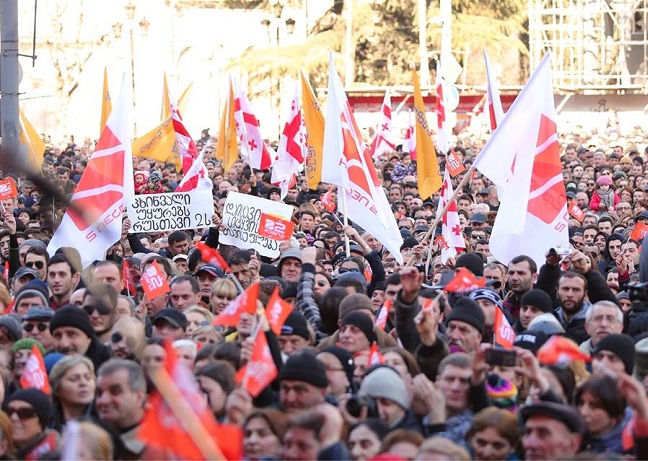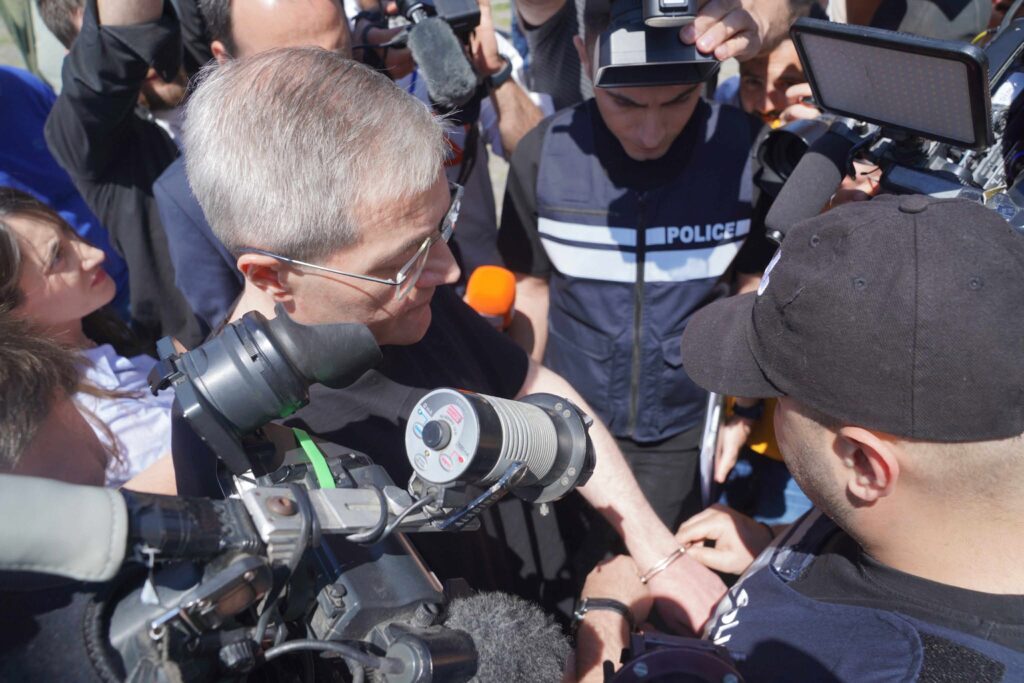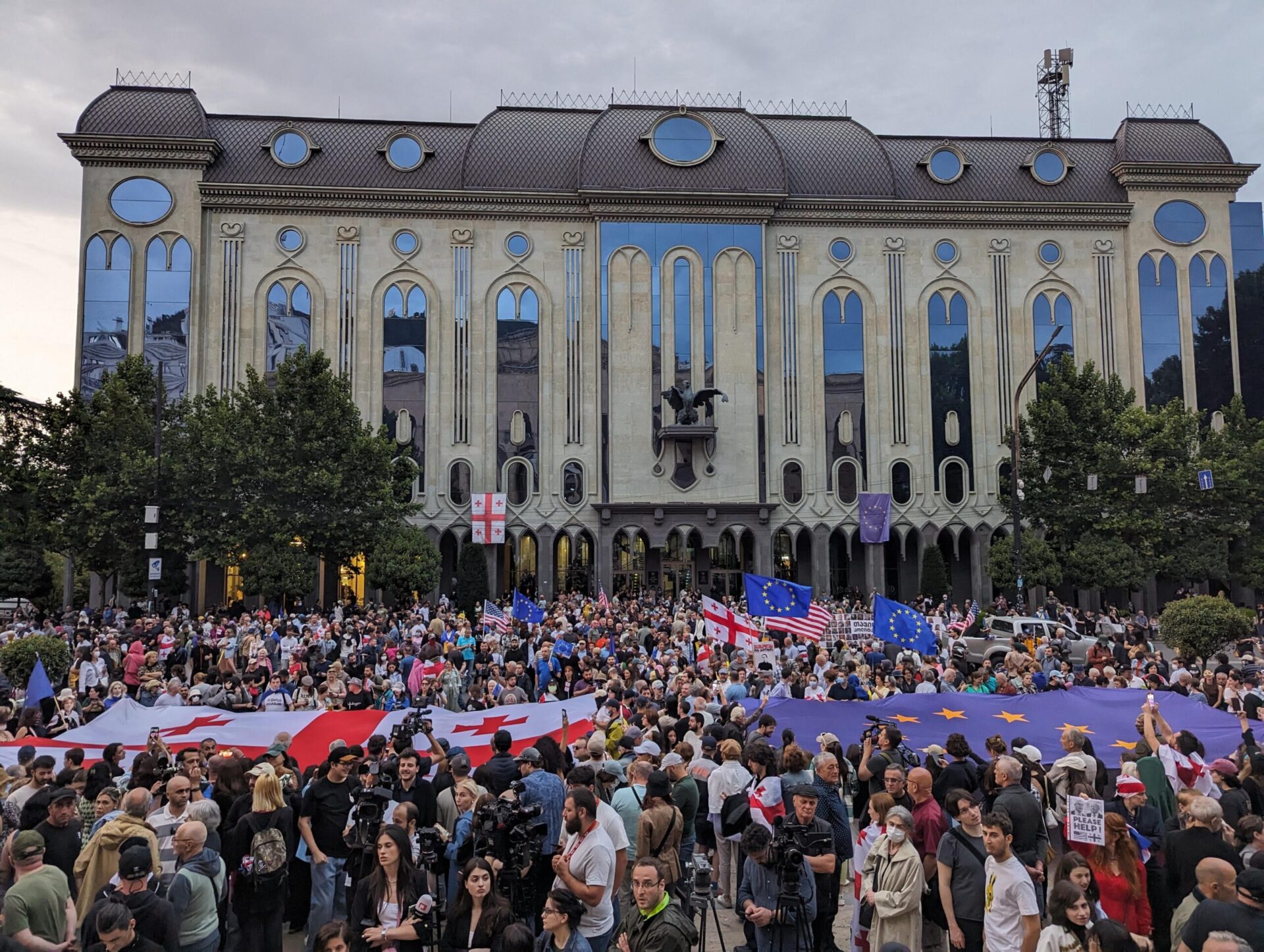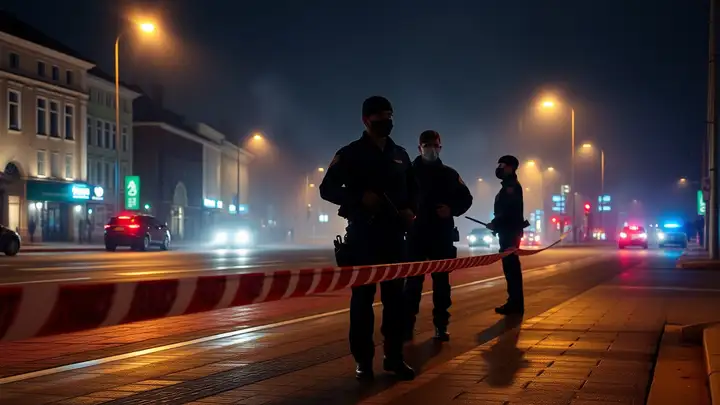
Can Channel Rustavi 2 Remain the Voice of the Opposition?
Can Channel Rustavi 2 Remain the Voice of the Opposition?
The European Court of Human Rights (ECHR) has temporarily suspended the execution of the Georgian Supreme Court’s decision to return opposition television broadcaster Rustavi 2 to its former owner, the businessman Kibar Khalvashi (Civil Georgia, March 4). Khalvashi is affiliated with the ruling party Georgian Dream–Democratic Georgia, founded by billionaire Bidzina Ivanishvili. Whereas the present owners of the Rustavi 2 channel are Ukrainian businessmen Levan and Giorgi Karamanishvili—both close friends of former president of Georgia Mikheil Saakashvili.
All nine Georgian Supreme Court judges had unanimously delivered a verdict in favor of Khalvashi, on March 2 (Civil Georgia, March 2). Khalvashi’s lawsuit alleged that, in 2006, the authorities forced him to sell the TV station for a much smaller amount than its actual estimated price. He was also, allegedly, threatened with legal repercussions and the sudden emergence of obstacles to his business dealings should he refuse the sale of Rustavi 2.
In fact, since 2004, Rustavi 2 changed hands several times, and its current owners—the Karamanishvili brothers—have no relation to the company under which the TV channel was officially registered in 2006. Moreover, since then, Levan and Giorgi Karamanishvili invested several million dollars in the broadcaster’s development and built premises for it just outside Tbilisi. Besides Khalvashi and the Karamanshivili brothers, the original founders of Rustavi 2—David Dvali and Jarji Akimidze—also have a claim on retaking possession of the TV channel. They owned the broadcaster in 1994–2004 and assert that they sold it for a paltry sum to Kibar Khalvashi under “terrible pressure” from the authorities. Now, Khalvashi is trying to compromise with the founders and has offered them 50 percent of his expected shares, plus management rights. However, the director general of Rustavi 2, Nika Gvaramia, contends that Dvali and Akimidze are “fake figures, through which billionaire Bidzina Ivanishvili is trying to take control of the opposition TV channel by every possible means.” On behalf of the Rustavi 2 journalists, Director General Gvaramia has offered Khalvashi $3,944,397 as compensation for damages, in exchange for his waiver to further claims on the TV channel. But so far, the businessman has refused, saying that the proposed sum of money was inadequate (Civil Georgia, March 3).
Nevertheless, early this month, the Supreme Court ruled that the rights of businessman Khalvashi had been violated, and it upheld the decisions of the lower courts, which mandated the property be returned to him. Rustavi 2’s Gvaramia declared, on behalf of the TV channel’s team of journalists, that they would not obey the authorities’ requirements until the final decision of the ECHR was announced (Civil Georgia, March 4).
It is unclear when the European court will deliver its decision on the Rustavi 2 case. But it bears pointing out that the ECHR’s action to suspend the execution of the Georgian Supreme Court decision is an emergency measure, taken by the international tribunal only in exceptional cases. The suspension order, which is scheduled to expire on March 8, according to the ECHR’s original announcement, testifies to the significance attached to the Rustavi 2 case (Civil Georgia, March 4). Whatever the representatives of the Georgian government say about their non-interference in domestic legal affairs, the litigation around the oppositional broadcaster is being perceived as a fight over maintaining freedom of speech in Georgia. This interpretation is particularly driven by the fact that none of the other TV channels in the country are critical of the government (see EDM, March 1).
The Embassy of the United States in Tbilisi released a statement, on March 2, saying that the US government “views with concern the impact of the [Georgian] Supreme Court’s decision regarding Rustavi 2, which could effectively limit the access of opposition voices to Georgian broadcast media” (Ge.usembassy.gov, March 2). Whereas the European Union’s diplomatic representative office in Georgia noted its Delegation has been “monitoring the Rustavi 2 court case from the very start” and will “examine closely” the Supreme Court’s verdict “as well as its consequences.” At the same time, the statement added that the EU Delegation will keep to its “long-standing practice of not commenting on individual court decisions” (Europa.eu, March 3).
Georgian opposition parties are jointly advocating to retain Rustavi 2’s current ownership structure. A coordinating council of nine parties has been established. Meanwhile, opposition activists have decided to stage a permanent protest rally in the TV channel offices’ courtyard, where tents have already been put up (Kommersant, March 3).
Nicanor Melia, the executive secretary of former president Saakashvili’s opposition party United National Movement (UNM), told journalists that party activists, representatives of non-governmental organizations (NGO) and TV viewers would not allow for a violent capture of Rustavi 2. He added that if the authorities tried to use force to disperse the demonstrators, mass anti-government protests would begin across the country. At the same time, the opposition believes that the founder of the ruling coalition, Ivanishvili, needs the “capture” of Rustavi 2 to implement his far-reaching geopolitical plans. “He is a Russian [sic] oligarch and is planning to return Georgia to Russia’s orbit, but he is hampered by Rustavi 2, which details all of Ivnishvili’s pro-Russian projects,” asserted Nugzar Tsiklauri, one of the leaders of UNM (Author’s interview, March 4). Earlier, Davit Darchiashvili, a representative of another pro-Western opposition party, European Georgia, explained the importance of maintaining Rustavi 2 and its current editorial policy: “Almost all other TV companies [in Georgia] are more or less controlled by the authorities. Rustavi 2 is the oasis, where the opposition has its voice and can convey its own views to the public” (Author’s interview, February 28).
The Rustavi 2 case is becoming the most important political event in Georgia. Many believe that the future of Georgian democracy and its Euro-Atlantic prospects depend on its outcome. The existence of Rustavi 2 in its present form, the channel’s supporters maintain, is vital for upholding a pluralism of views and a democratic multi-party system. Both of these will be necessary to allow an opposition party with a realistic alternative development platform for the country to eventually emerge and have a chance to come to power.


